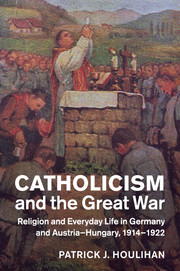
- Publisher:
- Cambridge University Press
- Online publication date:
- May 2015
- Print publication year:
- 2015
- Online ISBN:
- 9781139547321

This transnational comparative history of Catholic everyday religion in Germany and Austria-Hungary during the Great War transforms our understanding of the war's cultural legacy. Challenging master narratives of secularization and modernism, Houlihan reveals that Catholics from the losing powers had personal and collective religious experiences that revise the decline-and-fall stories of church and state during wartime. Focusing on private theologies and lived religion, Houlihan explores how believers adjusted to industrial warfare. Giving voice to previously marginalized historical actors, including soldiers as well as women and children on the home front, he creates a family history of Catholic religion, supplementing studies of the clergy and bishops. His findings shed new light on the diversity of faith in this period and how specifically Catholic forms of belief and practice enabled people from the losing powers to cope with the war much more successfully than previous cultural histories have led us to believe.
Co-Winner, 2015 Wiener Library Ernst Fraenkel Prize, The Wiener Library
'By framing his study as a cross-border examination - simultaneously reviewing the Catholic experience in Germany, where believers formed a ‘suspect minority,’ and in Austria-Hungary, whose Catholics represented a ‘favored majority’ - the author avoids the trap of being misled by country-specific features and can demonstrate that his findings reflect the transnational nature of a shared Catholicism in the two countries. Houlihan has conducted extensive research in the Austrian, German, and Vatican archives and displays an impressive command of the published literature.'
Albert L. Brancato Source: Journal of Jesuit Studies
Usage data cannot currently be displayed.